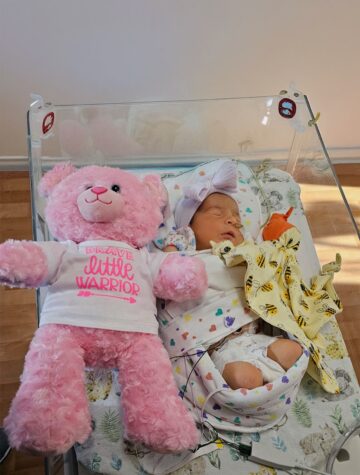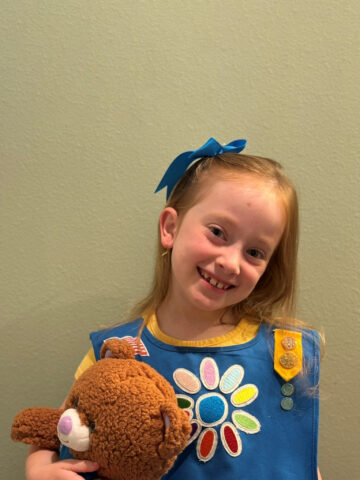Although many parents and caregivers may be familiar with adults getting painful kidney stones, kids can get them too. In fact, throughout the past several years, more and more kids have been diagnosed with kidney stones.
Dr. Kai-Wen Chuang, pediatric urologist at CHOC, wants parents and caregivers to know that kidney stone prevention is important for kids and teens. Here, she offers advice on how to recognize symptoms of kidney stones and how to prevent them.
Why are more kids and teens getting kidney stones?
In the last several years, there has been an uptick in cases of kidney stones in kids and teens up to age 20 years globally. This means that annually, there is a five to six percent increase in kidney stone diagnoses in this age group.
The increase in kidney stone diagnoses is most prominent in females who are 15 to 19 years old — meaning that they are an especially at-risk population for kidney stones, explains Dr. Chuang.
Because of this increase, 100 kids are being seen daily for kidney stone symptoms in emergency rooms nationwide, and about 20 of those kids may be hospitalized for kidney stone treatment.
Learn more about kidney stones from CHOC.
How to prevent kidney stones in kids and teens
To help prevent kidney stones in kids and teens, Dr. Chuang advises that kids do the following:
Drink more fluids
Studies have shown that people don’t know how much water they drink, says Dr. Chuang. Most adults and kids are underhydrating, which can affect their urinary health and cause kidney stones.
A guide for remembering proper hydration for kids is that they need one eight-ounce glass of water daily depending on what age they are.
For example, if you have a 1-year-old, they need one eight-ounce glass of water per day, a 2-year-old needs two glasses and so on. This pattern goes until your child is 8 years old, and then it maxes out. So as your child grows, they will continue to need eight eight-ounce glasses of water daily (64 ounces total) — even into adulthood.
Urine color can also help show how hydrated a child is, says Dr. Chuang. A well-hydrated child should have clear, diluted urine instead of dark, concentrated urine. So even if you are following the guide above, you child’s water consumption may need to be adjusted during hot weather, how much activity your child is getting and how much they sweat.
Get more tips on how much water your child should drink from CHOC experts.
Eat less salt
“There is a common misunderstanding to avoid calcium to prevent kidney stones,” says Dr. Chuang. “Actually, you need to avoid salt.”
Limiting salt in your child’s diet can help prevent kidney stones. Try to cut back on salty, processed snacks like potato chips and pretzels, and try to make meals at home so you can control how much salt is used.
“For adults, it may also be recommended to limit animal proteins in their diet to prevent kidney stones, but kids don’t need to strictly,” explains Dr. Chuang. “They need the protein because they are growing.”
Eat more citrus
Citrus is a natural way to prevent kidney stones. Incorporate more lemons, limes and oranges in your child’s diet.
One tip is to add some lemon slices to your child’s water bottle, says Dr. Chuang. That way they are hydrating while also getting some citrus.
Keep an eye on antibiotics
The use of antibiotics in kids may affect their gastrointestinal (GI) system, which can lead to kidney stones. If your child is taking antibiotics, make sure they stay hydrated and take probiotics.
Also, remember that if your child has had a kidney stone diagnosis in the past, they will be 50% more likely to have another stone in the next three years. Make sure to use the preventative measures above if your child has a history of kidney stones.
What causes kidney stones in kids and teens?
There are two categories of causes of an increase in kids and teens experiencing kidney stones, explains Dr. Chuang, such as:
Genetic causes
Genetic causes of kidney stones are much more common in kids than adults. Kids may be born with genetic predispositions and metabolic disorders that affect their urinary flow. If kids have conditions that require tube feeding or they are not mobile due to spine injuries, they also may be more prone to kidney stones.
Additionally, if adults in your family are prone to kidney stones, your child may be also.
Environmental causes
Environmental causes don’t often cause kidney stones in babies and toddlers. If a parent is seeing symptoms in young kids, it will usually be caused by genetics. However, environmental causes may affect kids, and especially teens.
Environmental causes of kidney stones in kids and teens include:
- Diet.
- Poor hydration.
- High intake of salt.
- Antibiotic use.
Fortunately, environmental causes of kidney stones can be improved with positive changes in their diet and hydration.
What signs of kidney stones can parents look out for in their kids?
Dr. Chuang says that kidney stone symptoms may vary depending on your child’s age.
For younger kids, kidney stone symptoms may include:
- High fevers.
- Blood in urine.
For older kids and teens, kidney symptoms will be like what adults experience, such as:
- Pain.
- Nausea.
- Fever.
Learn more about kidney stone symptoms from CHOC.
When should parents call the doctor about kidney stones?
If parents are seeing symptoms, they should start by calling their pediatrician for kidney stone treatment. Pediatricians can perform tests like a kidney or bladder ultrasound, or they may refer you to a urologist.
If there is blood in your child’s urine, if they have persistently high fevers (over 101.5 degrees) that aren’t going down with fever medication or if they are lethargic or not eating, take them to your nearest emergency department, says Dr. Chuang.
Do you expect kidney stone cases to increase even more in the future?
“If the current trends hold, more and more kids and teens may get kidney stones,” says Dr. Chuang.
Prevention is key, and getting informed about kidney stones is a great place for parents to start. By promoting a balanced diet and hydration, kids can receive numerous health benefits — including kidney stone prevention!
Get more expert health advice delivered to your inbox monthly by subscribing to the KidsHealth newsletter here.
Learn more about hydration tips from urologists at CHOC
When a child needs urology care and services, their needs are very different from an adult patient. CHOC urology program has dedicated doctors, specialists and treatments just for kids.





